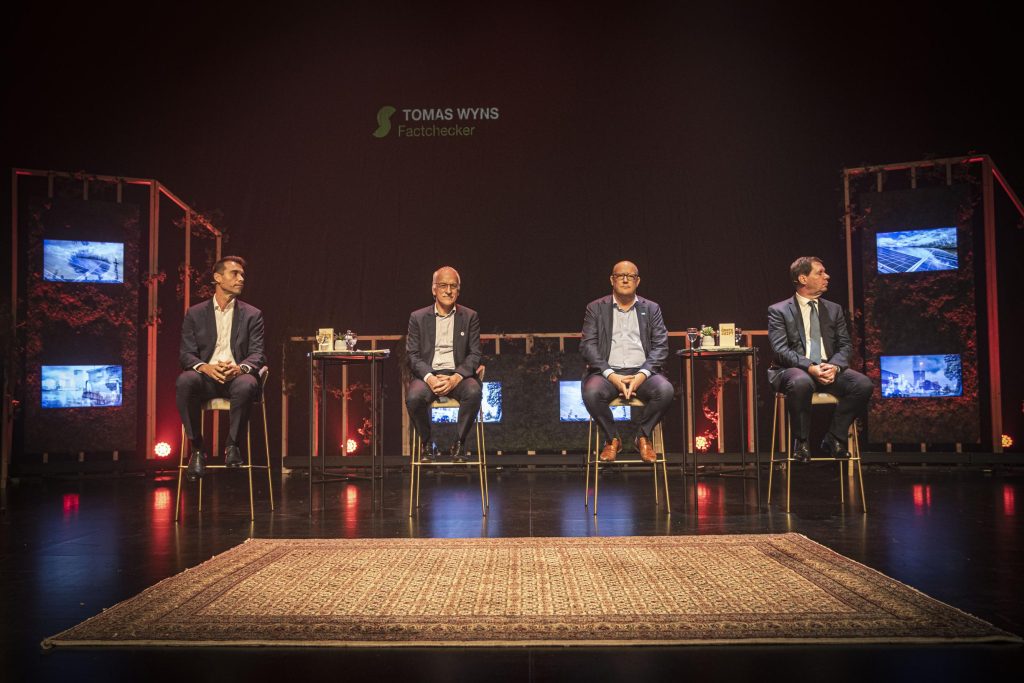Our industry needs new energy and carbon dioxide infrastructure so that we can switch to completely CO2 free production. That would be without nuclear power. Electrabel CEO confirmed that it is too late to expand nuclear power plants.
Yesterday’s third climate discussion by De Standaard brought together the four Belgian companies that make up a fifth of our country’s total CO2 emissions: steel plant ArcelorMittal Gent, BASF Antwerp, Total and Electrabel. The last three account for half of the total carbon dioxide emissions in the port of Antwerp. But together they also provide more than 14,000 direct jobs and several thousand more through subcontractors.
CEOs have already done their best to convince the public that they are serious about greening their activities. Geert van Polford, CEO of all steel mills ArcelorMittal, played the leading role. Recently announced a major green investment in a steel mill in the Ghent Canal region.
Natural gas is still necessary
Jack Bucklers of TotalEnergies Antwerp said that while his company is committed to producing more renewable energy, he also said he will continue to invest openly in expanding natural gas production. According to him, natural gas will remain necessary in the coming years for the rapid replacement of coal, which is still used to produce electricity. He considers the statements of the International Energy Agency, for example, that the drilling of new oil and gas fields should stop immediately “unwise”.
“If we follow this advice, energy will become more expensive in the coming years.” He concludes that much more natural gas and oil will be needed in the future.
• Relive the Great Transformation | Expanding nuclear power plants? only too late”
CEOs have also made it clear that massive amounts of green energy are needed to make their factories more environmentally friendly. Question marks have been raised about the role of green hydrogen. This is indeed a legend of the steel industry, Van Bolford said. To run the steel plant in Ghent entirely using green hydrogen, massive amounts of green electricity are needed to produce this hydrogen. He estimated that this is equivalent to a quarter of the total current energy consumption in our country.
No infrastructure capacity
Particularly large infrastructure works will also be required in order to green the Belgian industry. Thierry Seigmann, CEO of Electrabel, noted that domestic renewable energy production capacity would not be sufficient, despite the recent announcement that the capacity of an upcoming wind power plant in the North Sea will be significantly increased.
It is estimated that by 2050 three times the energy that is imported today will have to be imported. It should then come from the continents where the sun often shines and where there are many winds. Electrabel has joined forces with several other companies to be able to introduce large quantities of green hydrogen by 2035. It also wouldn’t be enough to build several wind farms offshore, or to supply large tankers full of green hydrogen to ports or to capture carbon dioxide on a large scale. Wide in companies. Jan Remisen of BASF-Antwerp pointed out that carbon dioxide, hydrogen and green electricity must also be transported to and from companies. This requires pipelines and high pressure lines. Its construction encountered great social resistance.
The CEOs have also made clear that the costs of creating and financing new energy infrastructure cannot be expected to be paid for. It should be a joint effort involving many partners. Including the government. In the 1960s, the government made significant investments in the ports, which led to the creation of many businesses and a great deal of prosperity. Now such an effort is needed again, says Jan Remaison. Billions will have to be allocated for this. And it’s not just the Flemish or Belgian government. The new hydrogen, electricity and carbon dioxide infrastructure required does not stop at the borders. “European infrastructure is needed.”
After all, the chief executives of Belgium’s largest industrial companies could not hide the fact that they watch with increasing astonishment how our country discusses the electricity supply of our country in the future.
Gert van Bulvoord: “We’re always told what we don’t want. There are no gas power plants, no nuclear power plants, no wind farms. It’s time to figure out what we want. Otherwise they will decide outside how to make our electricity.”
However, it is simple for Jan Remeysen. All that matters is safety of delivery, durability, stable and reasonable price. My message to the authorities is: Compare options based on these three criteria and make a decision.
And then Electrabel CEO Thierry Seigman made it clear that nuclear power was no longer eligible for it. “The extension of nuclear power plants will come too late to ensure power supply from 2025.” He believes that building gas-fired power plants is a more realistic scenario. “Building a gas-fired power plant is like running 100 metres, to extending a nuclear power plant to an altitude of 3,000 metres.”
Watch the full discussion here:

“Total coffee specialist. Hardcore reader. Incurable music scholar. Web guru. Freelance troublemaker. Problem solver. Travel trailblazer.”







More Stories
Bitcoin price rises after new jobs data from US
European stock markets open higher | beursduivel.be
Russia’s oil imports to China decline